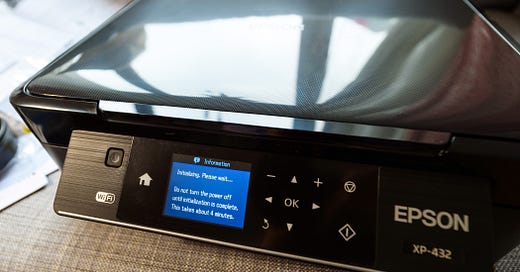
The Week in Repair: Jan 25-Feb 1
Germany the latest to introduce “repairability index; call for right to repair in Quebec; circular economy approach needed for electric vehicles
🇩🇪 Germany to introduce "repairability index" to boost sustainability
As consumer waste continues to rise, conversations across Europe have turned to how companies can be encouraged to repair their products, rather than simply asking consumers to replace them. Consumer Protection Minister Steffi Lemke has now weighed in on the debate, calling for Germany to introduce a nationwide repairability index.
Minister Lemke wants to take the initiative one step further, to pressure companies to build certain devices, like smartphones and tablets, in "such a way that their battery and individual parts - as far as technically feasible - can be easily removed and replaced." (iamexpat.de)
💻 You Own It. Why Aren't You Allowed to Fix It?
If you’ve ever tried to fix an electronic device, you’ve probably run into one of those funky-shaped screws, or tenacious glue-blobs holding broken pieces in place. Or maybe, if you’re lucky enough to have a repair place close by, you’ve taken it to a shop only to learn that it’ll cost more to fix than to replace. The result is that a lot of e-waste that could be salvaged winds up getting junked.
House Bill 1810, sponsored by Washington state Rep. Mia Gregerson, would fix that situation by requiring big tech companies like Samsung, Apple, and Microsoft to make tools and tech specs available to anyone who wants to repair their own devices. The bill has carved out exemptions for trade secrets and safety concerns, among other considerations. (thestranger.com)
🌀 A circular economy approach is needed for electric vehicles
Electric vehicles could help reduce greenhouse gas emissions and deliver a sustainable transport system. But the full life cycle of electric vehicles needs to be considered in order to avoid creating resource issues while trying to achieve the necessary climate goals. The future of mobility — and road transport in particular — is a topic of increasing focus for governments across the globe as they seek to reduce greenhouse gas emissions.
Circular strategies to deal with waste include reusing, repairing, refurbishing, remanufacturing and recycling. There are already well-developed secondhand parts and car markets that can prolong vehicles’ lifetimes, and a key question will be about optimal lifetimes and circular strategies, the nuances of which will change over time. (nature.com)
🕰️ We’ll lose more than a few broken antiques if traditional skills die out
Anyone who wants to know the right time has only to glance at their phone or digital watch. Mechanical clocks, by comparison, are quirky and prone to foibles. They require winding, cleaning and adjustment – the sort of attention for which there is little time in busy modern lives. It is no wonder that, if not quite on the verge of extinction, they seem destined to become luxuries for people who can afford to spend a fortune on a precious timepiece.
Yet perhaps there is a gleam of hope. From BBC One’s The Repair Shop, to the Government’s “right to repair” law, to the unexpected popularity of online and real-life darning and mending classes, the impulse to repair rather than replace is gathering momentum. Like the bashed-up heirlooms of The Repair Shop, and the tattered garments given new life with colourful darns and patches, mechanical clocks have a charm and character that speaks eloquently to our troubled age. (blogh1.com)
🔧 Fixer upper: Right to repair could soon be a reality
The idea behind these right to repair laws is that expensive tech like phones and computers should be more like cars: you don’t take it to the junkyard because it needs a new battery. Instead, tech parts could be interchangeable among different models or devices. But tech manufacturers have blocked this process, and newer models make products obsolete quickly, putting consumers into a cycle of paying off and replacing phones nearly every two years (Americans were forecast to spend $73 billion on smartphones, with 147 million smartphone shipments expected in the US in 2021). Laptops and tablets don’t fare much better, with an average lifespan of three to five years.
Repair shops and sellers say customers are ready to ditch wasteful buying habits now. But even those who don’t want to crack open their phones would still fare better if these laws passed. That could mean more independent shops popping up and driving down repair costs, similar to picking a small mechanic over a dealership to service a car. And just the opportunity to rehab tech could increase resale value if people do decide they want to ditch old devices instead of repairing them, Wiens said. (morningbrew.com)
🇮🇪 Irish training program for repair technicians to aid circular economy
The Circular Economy Skills Initiative is training a new generation of repair engineers from across Ireland. It aims to combat a major national shortage in white goods repair technicians, producing enough qualified experts to extend the lives of fixable electrical appliances such as washing machines, dishwashers and dryers.
Ian Collins, chairman of the White Goods Association (WGA) said: “Education, training and upskilling are key to supporting more circular actions related to the supply of electrical goods and services. With a new generation of skilled repair engineers, we can ensure perfectly repairable electrical appliances are kept in use for longer. (meathchronicle.ie)
🇨🇦 Quebec environmental watchdog urges province to adopt 'right to repair' law
In the report released this week on the state of waste disposal and landfill in Quebec, the BAPE found Quebec was nowhere close to meeting its waste-reduction targets, and that "enshrining by regulation the right to repair" is essential to getting things back on track.
Bill 197 would amend the Consumer Protection Act to "fight planned obsolescence and assert the right to repair goods." The bill would require all household appliances sold in Quebec to have a label indicating a sustainability rating — basically a degree of difficulty for repair. (cbc.ca)
🗞️ Other Repair News...
• 7 Best Modular Laptops with Upgradeable Components (robots.net)
• IoT Implications? Lawsuit Alleges Lock-In Maintenance (rtinsights.com)
• Amy Klobuchar on the tech lobby’s all-out war on antitrust legislation (fastcompany.com)
• Oculus Quest 2 Teardown: Into the Metaverse (ifixit.com)
• One of Amazon’s seller programs has been found unlawful (engadget.com)
• DHL: supply chain must drive move to circular economy (supplychaindigital.com)
• PepsiCo moving to 100% recycled plastic in chip bags by 2030 (foodnavigator.com)
• Ontario creates new agency to boost trades (autoserviceworld.com)
• Tech CEOs urge senators to back antitrust bill (newsconcerns.com)
• How to keep used and unwanted clothes out of landfill (scmp.com)









